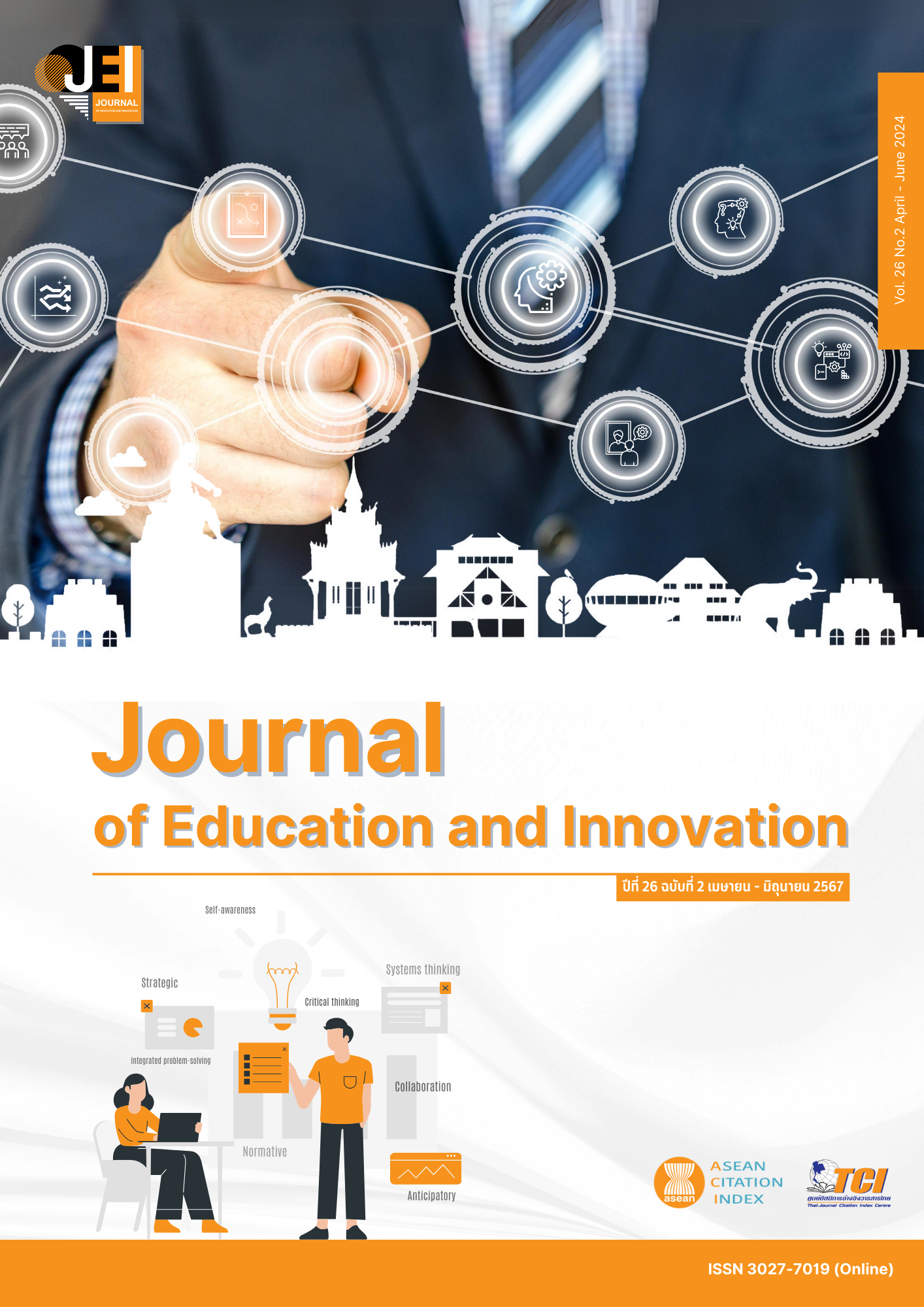ENHANCING SOCIAL COHESION IN THE AGING SOCIETY WITH AN ADDITIONAL COURSES ABOUT KNOWLEDGE INTEGRATION OF LOCAL CULTURE IN ORDER TO LIVE TOGETHER IN A QUALITY SOCIETY FOR GRADE 3 STUDENTS
Main Article Content
Abstract
The objectives of this research were 1) to study the necessary needs for additional courses development, 2) to create additional courses, 3) to try out the additional courses by comparing the social cohesion, and 4) to assess the additional courses, implemented by research and development in 4 phases: 1) study the needs by document synthesis Interview with curriculum experts culture and 30 elderly people. The data were confirmed by focus group discussions with 10 experts; 2) prepare additional courses and assess the curriculum quality of additional subjects with 18 teachers; 3) trial with 30 students in One Group Pre-Posttest Design and interview with 21 parents; and 4) assess the curriculum with teachers, parents and 34 students analyzed the mean, standard deviation and comparing social cohesion by dependent t-test, it was found that 1) the course was the most necessary, 2) additional courses consist of principles, aims, and important competencies of learners. desirable characteristics, structure, course description learning outcomes scope of content, study time, guidelines for organizing learning activities media/learning resources measurement and evaluation. The contents consisted of 1) family members and roles and responsibilities of children towards fathers, mothers, guardians and relatives, 2) taking care of family members consisting of stepping, washing and soaking feet with herbs, 3) costume sweeping, mopping, helping to lift, store dishes, bowls, and 4) behavior appropriately. The way of organizing activities is focused on students. The teachers work with learners to search for knowledge and create a body of knowledge. Family practice There were media/learning resources: 1) knowledge sheets, 2) activity sheets, 3) pictures, 4) internet, and 5) own home/family. The measurement and evaluation methods were used as follows: 1) knowledge: pre-test and post-test check the activity sheet, 2) process skills use the observation of operational behavior operational behavior recording and quality assessment results for additional courses, 3) students had higher post-learning social cohesion than before at the statistical significance level of 0.01, and 4) input side process and productivity were at the highest level.
Article Details

This work is licensed under a Creative Commons Attribution-NonCommercial-NoDerivatives 4.0 International License.
The owner of the article does not copy or violate any of its copyright. If any copyright infringement occurs or prosecution, in any case, the Editorial Board is not involved in all the rights to the owner of the article to be performed.
References
Department of Women's Affairs and Family Development. (2010). Survey of women's rights violations in Thailand. Retrieved April 11, 2022, from https://www.m-society.go.th/ewtadmin/ewt/mso_web/article_attach/127.81/17037.pdf
Kaewdonhan, A. (2019). Curriculum development of additional courses. magic worm Mathematics learning group Grade 1 by learning management based on the concept of STEM education (Master thesis). Khon Kaen: Khon Kaen University.
Kullachart, J. (2014). The development of selective courses curriculum, on the topic of invention from recycled materials to promote the creative thinking of students in Pratomsuksa 6 (Master thesis). Maha Sarakham: Mahasarakham University.
Larsudta, S. (2015). The Additional Curriculum of Career and Technology Learning Strand on Cloth Products of Local Invention for Matthayomsueksa 2 (Master thesis). Maha Sarakham: Mahasarakham University.
Ministry of Education. (2017). Basic Education Curriculum, B.E. 2560 and amended (2nd edition), B.E. 2560. Bangkok: Freight and Parcel Organization (R.S.P.).
National Statistical Office. (2018). The health care behavior of the Thai population is increasing using information from Health and Welfare Survey. Bangkok: National Statistical Office.
Paffenholz, T. (2010). Civil society & peace building: A critical assessment. Boulder: Lynne Rienner Publishers.
Pitikultang, S. (2020). The 9th National Conference on Family Health on “Thai Family in Social Transition”. Retrieved May 8, 2020, from https://iptv.mahidol.ac.th/topic/79324
Pothisita, C. (2009). Science and Art of Quality Research amended (2nd ed.). Bangkok: Amarin Printing and Printing.
Sangkhasila, T. (2016). The development of additional course of work-oriented experience and technology career to enhance ability for creative thing on problem solving for the grade 6 students (Doctoral dissertation). Maha Sarakham: Mahasarakham University.
Sancharoen, P. (2018). The development of a supplementary course in the learning area of occupations and technology entitled “Kanom Jeen Pang Mug” for grade 5th students at Pong Sa Tue School (Master thesis). Phitsanulok: Pibulsongkram Rajabhat University.
Siriwannabut, P. (2013). Developmental psychology theory. Bangkok: Chulalongkorn University Press.
Stufflebeam, D. L. (1971). Educational evaluation and decision making. Illionis: F.E. Peacock Publishers.
Wechwithan, P. (2014). An introduction to family theories. Bangkok: Printmaking.
Wonganannon, P. (2014). Excessive internet usage behavioral in adolescents. Journal of Royal Thai Army Nursing, 15(2), 173-178.
Worasiangsuk, J. (2016). Classical sociological theory. Bangkok: M&M Laser Print.
Wongrattana, C. (2008). Experimental research patterns and analytical statistics: Basic concepts and methods. Bangkok: Srinakharinwirot University.


